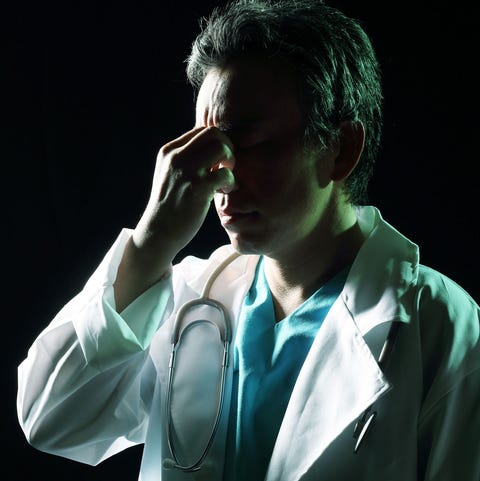When I broke up with my first serious girlfriend (well, she did the breaking up), I was naïve, egocentric, and convinced I could think my way out of anything. I was also 17 years old, which may explain a large part of that. I was intensely sad, but the sadness didn’t go away. I had just moved from California to Chicago, right at the beginning of my senior year in high school, and felt I had a perfect explanation why I felt down all the time. I thought of it as a sign that my relationship was so deep and powerful that I looked at my feelings with a sense almost of pride.
Weeks went by and I continued not to take pleasure in anything. Things that should have made me happy didn’t. I didn’t look forward to anything. I had a hard time falling asleep at night, and I woke up with a physical pressure sensation on my chest and my beloved’s name on my lips. Dying of consumption seemed a romantic notion (I read a LOT of nineteenth century literature). But it wasn’t until I had unbidden thoughts of who should get all my stuff when I died that I realized that something was really wrong. It was briefly clear to me that the depth of feeling I had—despair is not too strong a term—was affecting me far more deeply than I thought it could. In a strange way, this gave me a sense of relief. It’s not that I felt better, merely that I could identify where my mental and physical symptoms were coming from.
I didn’t talk to my parents, to my sister, or to any of my friends about it. It wasn’t that I was ashamed, it just didn’t occur to me to do so. It certainly didn’t cross my mind to see a doctor: I was seventeen years old and in perfect health. The idea I might not be in perfect mental health didn’t even cross my mind.
The idea I might not be in perfect mental health didn’t even cross my mind.
Six months went by, and as my first winter in Chicago started to turn to Spring, I slowly began to feel myself again. I enjoyed time with friends. I started to do better in school and to take interest in academics again, rather than going through the motions.
It wasn’t until years later, in medical school, that I finally realized that I had been through a pretty textbook case of major depressive disorder. It was a bit of a shock reading about it. The diagnosis of depression is clinical, meaning that it comes from an experienced clinician doing a careful interview and exam, and not from blood testing or imaging studies. Experience is essential because interpreting the answers to the questions requires judgment: it isn’t always a simple yes or no answer, despite the fact that the official diagnostic criteria (from the psychiatric reference book called the DSM-5) sound like yes or no questions:
Five or more of these criteria for almost every day for two or more weeks meet the diagnosis of major depressive disorder (but that has to include one of the first two listed). There are some conditions that exclude the diagnosis: symptoms cannot be due to another medical condition (uncommon); may not be due to drug use or withdrawal (not as uncommon); and if these occur with episodes of mania or hypomania (times of extreme energy, often associated with poor judgment), the diagnosis is not unipolar depression but bipolar disorder. The symptoms have to be severe enough to cause significant distress or psychosocial impairment.
Primary care doctors like me are the ones who most frequently make the diagnosis.
Psychiatrists are the experts in making the diagnosis, but primary care doctors like me are the ones who most frequently do make the diagnosis—although they may not catch it every time. It’s now recommended for physicians to screen patients for major depression, but there will still be people like me who have symptoms but don’t bring themselves to medical attention. It’s much easier to treat if you do check in with a doctor. What else to do:
Get one of the leading treatments
There are two major treatment options for major depression: medications and psychotherapy. Some people have strong feelings about these treatments. Each is effective on its own; a combination of the two is even more effective. There are many different types of drug treatments, and a clinician will choose one based on their best guess of effectiveness and side-effects in an individual. There is increasing evidence that testing for genetic variants can help precisely guide the best medication for an individual; however, this is not yet recommended in general, and I have used it only when a patient has not had success in finding an effective treatment.
Getty ImagesRunPhoto
Psychotherapy often makes people think of many sessions undergoing analysis on a couch: this type, called psychodynamic therapy, is not the way therapy is typically done for depression. Interpersonal therapy addresses a person’s relationships, and is intended to change behaviors with family and friends and lasts for 3-4 months, typically, as opposed to psychodynamic therapy, which addresses unresolved childhood issues and unconscious feelings, and typically lasts for years. Cognitive behavioral therapy is another short-term treatment which helps people learn how to understand their feelings and beliefs, and gives exercises to improve awareness of these and make changes to improve them. Both of these therapies have been shown to be effective in depression.
Lose the idea that it’s something to be hidden
Even in 2019, there remains a stigma to mental illness, and many people (especially men) feel that depression is a sign of weakness, and they are loath to admit it, to themselves or to people who might help them. This is a barrier I have had to fight many times. I tell people that they can’t control whether they get high blood pressure, but that it can be treated, and treatment reduces the risk of harms. Depression is similar. Untreated, it leads to a higher likelihood of bad outcomes that aren’t just about continuing to feel depressed; they include effects on other people (family, friends, work); a higher likelihood of drug and alcohol abuse; and the biggest danger of all, suicide. Depression can be a fatal illness.
I tell people they often can’t control whether they get high blood pressure. Depression is similar.
Beware being number one
Men are at higher risk for suicide. Although men and women are about equal in thinking about suicide and in suicide attempts, men are much more likely to be successful. We’re number one, but this is not an area where men want to be leading the way. Treatment of depression in somebody contemplating, or worse, planning, suicide is a little different. Also, a person’s age determines not only their risk for suicide (older men are at the highest risk of all), but also how treatment affects suicidal risk. A medicine like Prozac (fluoxetine), for example, increases suicide risk in adolescents and young adults (at least in the short term), but decreases risk in older men.
This is not an area where men want to be leading the way.
Know it will get better—but you may not see that
One barrier to treatment of depression is the depression itself. Some people have an overwhelming fatigue that prevents them from going to see someone about it. If you are suffering, this means you need to make the effort. Get some help from family or friends in making the appointment. If you are the family or friend who’s seeing signs of depression in someone, you can help by helping to get them to an appointment. Assist them in finding a therapist in their network, offer to drive them to an appointment, help with child care if appropriate, or find some other way to reduce the barriers to getting there. One common finding in depression is an inability to see that things can ever get better. This sense of hopelessness is a cruel facet of the issue that prevents proper treatment. However, treatment is effective at restoring hope.
Some people have an overwhelming fatigue that prevents them from going to see someone about it.
Stay vigilant to the signs
Once a person has had an episode of depression, future bouts are much more likely than in a person who hasn’t: one study found that 13 percent of people had a recurrence within 5 years, 23% within 10 years, and 42% within 20 years. Fortunately, most people have a much easier time recognizing symptoms the second time around and are faster to seek care. Nobody who has had severe depression and who has gotten better wants to feel that way again.
It’s been well over 30 years since I have had depression. I know I am at risk in the future, and in times of stress, I have been vigilant about paying attention to my own feelings. Everyone has ups and downs, but feeling down most days for more than 2 weeks would be a red flag. I also recommend being forthright with the people that matter most: if they recognize that I am not myself they can feel safe in letting me know so that I could get treatment sooner. I don’t want to feel that way, and my family, coworkers, and friends don’t want that for me either.
Source: Read Full Article

